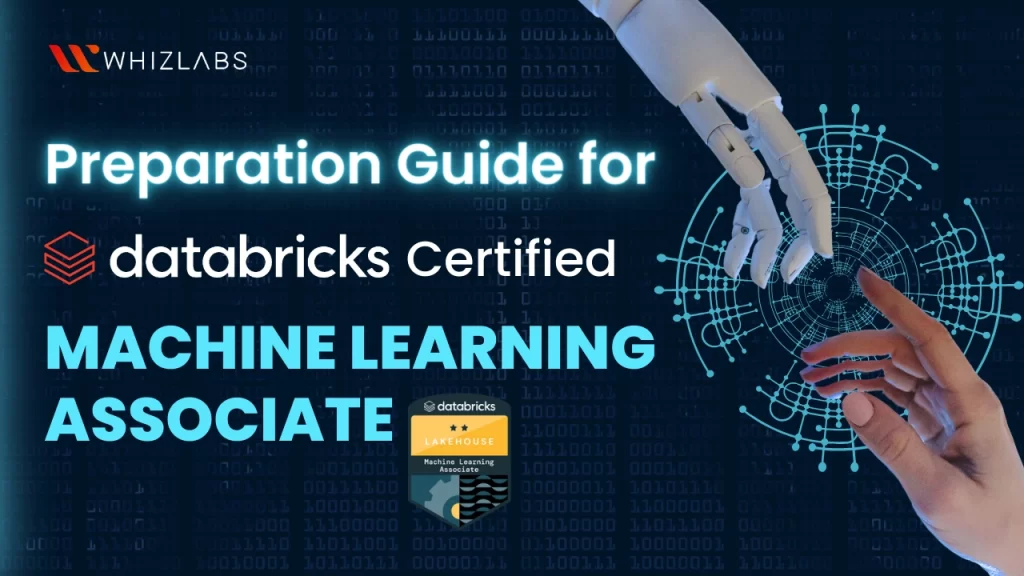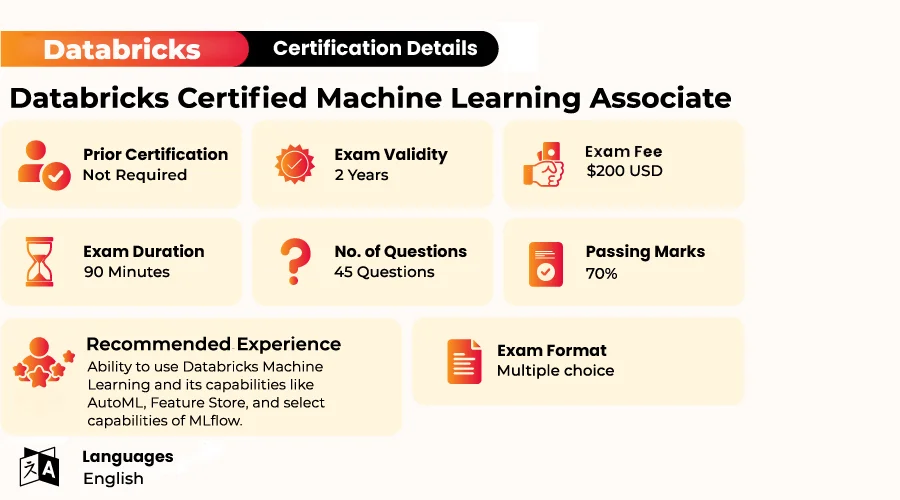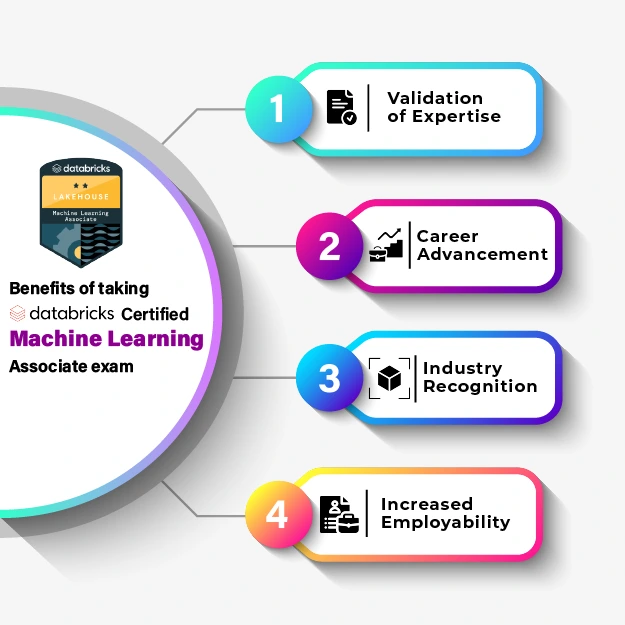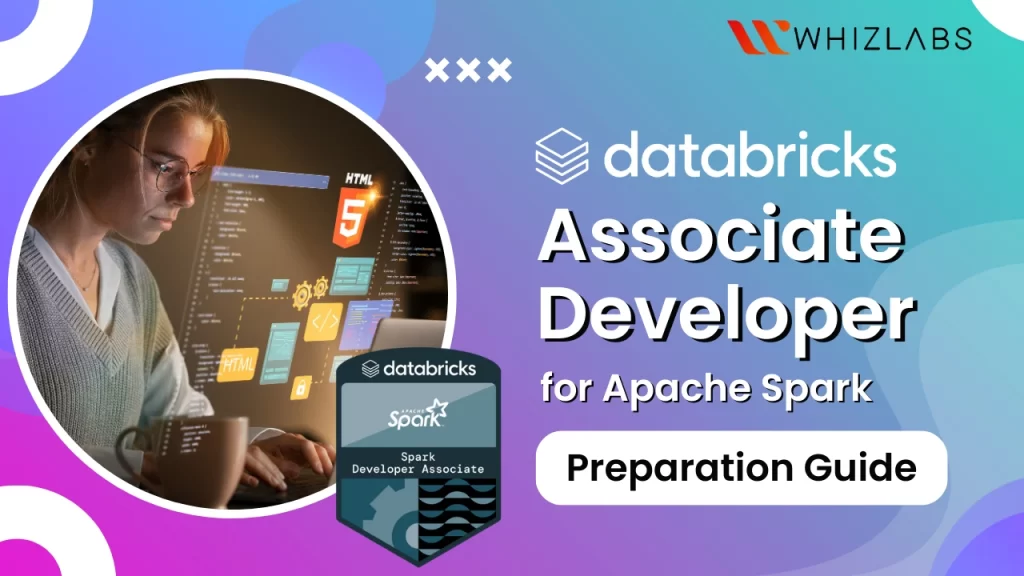Are you planning to take the Databricks Certified Machine Learning Associate Certification? If so, it’s essential to craft a well-structured preparation plan for success.
Databricks Certified Machine Learning Associate certification exam evaluates an individual’s proficiency in utilizing Databricks to execute fundamental machine learning tasks.
The blog post comprehensively covers essential elements of the Databricks Machine Learning Associate Certification. It includes a breakdown of necessary skills, defines the target audience, outlines the exam syllabus, suggests study resources, and offers valuable tips for achieving success in the examination.
Let’s dive in!
All about Databricks Certified Machine Learning Associate Certification
The Databricks Certified Machine Learning Associate certification is an associate-level exam and it evaluates an individual’s proficiency in utilizing Databricks to execute fundamental machine learning activities.
It covers key topics such as It includes topics such as data preparation, model training, evaluation, and deployment using Databricks tools and services. Additionally, it gauges the understanding of advanced aspects related to scaling machine learning models.
Successfully passing this certification indicates an individual’s capability to perform basic machine learning tasks using Databricks and its associated tools.
What skills are measured in the Databricks Certified Machine Learning Associate Certification exam?
Taking the Databricks Certified Machine Learning Associate Certification exam certification helps to assess one’s competence in comprehending and applying Databricks Machine Learning, including features such as AutoML, Feature Store, and selected functionalities of MLflow.
It evaluates the aptitude to make accurate decisions within machine learning workflows and implement them using Spark ML.
Upon completion of the Databricks Certified Machine Learning Associate Certification, you will be able to know about:
- Databricks Machine Learning Components
- AutoML in Databricks
- Feature Store in Databricks
- MLflow in Databricks
- Implementing Correct Decisions in ML Workflows
- Scaling ML Solutions with Spark
- Advanced Scaling Characteristics
Gaining the skills and knowledge in these areas can help to achieve significant milestone in your career.
What are the prerequisites required for the Databricks Certified Machine Learning Associate Exam?
No specific prerequisites are mandatory for taking the Databricks Certified Machine Learning Associate Exam.
Despite being an entry-level certification, candidates are expected to possess a minimum of 6 months of practical, hands-on experience in machine learning, as specified in the exam guide.
Who should attempt the Databricks Certified Machine Learning Associate Exam?
Databricks Certified Machine Learning Associate certification exam is more suitable for those who work closely related to machine learning work with Databricks.
Databricks Certified Machine Learning Associate Exam is well-suited for individuals in specific job roles, particularly at the associate level.
Here are the recommended candidates for attempting this certification:
- Individuals who are new to machine learning
- Databricks Users
- Data Scientists
- Data Engineers
- Analytics Professionals
- Big Data Professionals
- Professionals Transitioning to Databricks
Also Read : Best Machine Learning Certifications to Upskill your Career
What will you learn from the Databricks Certified Machine Learning Associate Certification exam?
The Databricks Certified Machine Learning Associate Certification exam aims to validate proficiency in the following areas:
- How to utilize Databricks AutoML for tackling diverse machine learning challenges and managing regression and classification tasks.
- How to employ MLflow to monitor the complete lifecycle of machine learning processes within the Databricks environment.
- How to register and deploy models into production seamlessly by leveraging MLflow and Databricks
- How to store model features efficiently within the Feature Store.
Exam format for Databricks Certified Machine Learning Associate Certification exam
Benefits of taking the Databricks Certified Machine Learning Associate Certification exam?
Obtaining the Databricks Certified Machine Learning Associate Certification comes with several significant advantages:
Validation of Expertise
Achieving this certification validates your proficiency in executing advanced machine learning tasks using Databricks and its associated tools. This certification serves as a testament to your skills, enhancing your credibility with potential employers and clients.
Career Advancement
Holding a Databricks certification can open up new avenues for career growth, particularly in data engineering or data science roles. Many employers actively seek certified professionals to fill key positions, recognizing the value of certified expertise.
Increased Employability
Certified individuals often enjoy high demand in the job market. Employers place value on certifications as they reflect a commitment to ongoing learning and skill development. Having the Databricks Certified Machine Learning Associate Certification can make you a sought-after candidate.
Industry Recognition
Databricks stands as a widely recognized platform in the data engineering and analytics industry. Being certified by Databricks adds significant credibility to your skills and knowledge, providing industry-acknowledged validation of your expertise.
Read More : Free 25 Databricks Machine Learning associate Exam Questions
Exam domains for Databricks Certified Machine Learning Associate Certification exam
Databricks Certified Machine Learning Associate Certification exam domains are partitioned into the following categories:
| Domains | Weightage |
| Databricks Machine Learning | 29% |
| ML Workflows | 29% |
| Spark ML | 33% |
| Scaling ML Models | 9% |
Here’s the detailed breakdown of each domain:
Domain 1: Databricks Machine Learning
Databricks ML
- Standard Cluster vs. Single-node Cluster
- Connecting External Git Provider to Databricks Repos
- Committing Changes from Databricks Repo
- Creating Branch and Committing Changes
- Pulling Changes from External Git Provider
- Orchestrating ML Workflows with Databricks Jobs
Databricks Runtime for Machine Learning
- Creating Cluster with Databricks Runtime for ML
- Installing Python Library on Cluster
AutoML
- Steps Completed by AutoML
- Locating Source Code for Best Model
- AutoML Evaluation Metrics for Regression
- AutoML Data Exploration Notebook
Feature Store
- Benefits of Feature Store
- Creating Feature Store Table
- Writing Data to Feature Store Table
- Training Model with Feature Store Table
- Scoring Model using Feature Store Table
Managed MLflow
- Identifying Best Run with MLflow Client API
- Logging Metrics, Artifacts, and Models
- Creating Nested Run for Tracking Organization
- Locating Run Execution Time and Code
- Registering Model with MLflow Client API
- Transitioning Model’s Stage with Model Registry UI and MLflow Client API
- Requesting Model Stage Transition with ML Registry UI Page
Domain 2: ML Workflows
Exploratory Data Analysis
- Computing Summary Statistics with .summary() and dbutils
- Removing Outliers from Spark DataFrame
Feature Engineering
- Importance of Indicator Variables for Imputed Values
- Handling Missing Values with Mode, Mean, or Median
- One-Hot Encoding Categorical Features
Training
- Random Search for Hyperparameter Tuning
- Basics of Bayesian Methods for Hyperparameter Tuning
- Challenges in Parallelizing Sequential Models
- Balancing Compute Resources and Parallelization
- Parallelizing Hyperparameter Tuning with Hyperopt and SparkTrials
Evaluation and Selection
- Cross-Validation vs. Train-Validation Split
- Performing Cross-Validation in Model Fitting
- Number of Models in Grid-Search and Cross-Validation
- Description of Recall and F1 as Evaluation Metrics
- Exponentiating RMSE for Log of Label Variable
Domain 3: Spark ML
Distributed ML Concepts
- Difficulties in Distributing ML Models
- Spark ML as Key Library for Distributed ML
- Spark ML vs. scikit-learn
Spark ML Modeling APIs
- Splitting Data, Key Considerations
- Training/Evaluating Model with Spark ML
- Spark ML Estimator and Transformer
- Developing Pipeline with Spark ML
- Key Considerations in Spark ML Pipelines
Hyperopt
- Parallelizing Hyperparameter Tuning with Hyperopt
- Bayesian Hyperparameter Inference with Hyperopt
- Relationship between Trials and Model Accuracy
Pandas API on Spark
- Differences Between Spark and Pandas DataFrames
- InternalFrame Impact on Pandas API Speed
- Scaling Data Pipelines with Pandas API on Spark
- Converting Data Between PySpark and Pandas on Spark
- Importing and Using Pandas on Spark APIs
Pandas UDFs/Function APIs
- Apache Arrow in Pandas <-> Spark Conversions
- Iterator UDFs for Large Data
- Applying Model in Parallel with Pandas UDF
- Using Pandas Code Inside UDF
- Training/Applying Group-Specific Models with Pandas Function API
Domain 4: Scaling ML Models
Model Distribution
- Scaling Linear Regression in Spark
- Scaling Decision Trees in Spark
Ensembling Distribution
- Basics of Ensemble Learning
- Comparing Bagging, Boosting, and Stacking
Study materials to refer to for the Databricks Certified Machine Learning Associate Certification exam
During the preparation phase, selecting reliable and up-to-date study materials is crucial. Databricks offers its comprehensive resource, the Databricks Official Documentation, covering aspects of Databricks machine learning concepts and more. This serves as a valuable reference for understanding the platform’s tools and features tested in the certification exam.
Refer to the Databricks Certified Machine Learning Associate exam guide and analyze the exam domains and objectives to get familiar with it. For an enhanced learning experience, consider enrolling in online courses provided by Databricks Academy. These courses are tailored to equip you with the skills necessary for the Databricks Certified Machine Learning Associate certification exam.
Supplement your learning with books such as “Learning Spark” by O’Reilly Media and “Mastering Databricks” by Packt Publishing, which delve into Apache Spark and Databricks concepts.
To assess your readiness for the certification exam, explore Databricks Certified Machine Learning Associate practice exams and sample questions online. These resources provide insight into the exam format and help identify areas that may require further study.
In the Databricks domain, practical experience is paramount. Engage in real-world projects involving Databricks, Spark, Delta Lake, and MLflow to apply theoretical knowledge. Based on your skill set, you can target various job roles.
Participating in online communities and forums dedicated to Databricks and Apache Spark offers collaboration opportunities with professionals and experts. Platforms like Stack Overflow and the Databricks Community are excellent places to seek advice and learn from others.
It is not advisable to rely upon databricks certified machine learning associate exam dumps. Instead, utilize the Databricks-certified machine learning associate practice exams.
Preparation tips for Databricks Certified Machine Learning Associate Certification exam
Here are some effective strategies to excel in successfully passing the Databricks Certified Machine Learning Associate Certification exam:
- Familiarize yourself with the exam objectives and domains by downloading the Databricks Certified Machine Learning Associate Certification exam guide.
- Create a schedule allocating specific time to each subtopic, ensuring comprehensive coverage of all concepts without leaving any gaps.
- Prioritize gaining hands-on experience in the practical skills required for the exam if you lack them.
- Supplement traditional learning methods like instructor-led videos and classroom sessions with additional resources such as YouTube videos focused on Databricks Certified Machine Learning Associate Exam Preparation.
- Once you’ve acquired a solid foundation in the recommended skills and domain knowledge, apply your theoretical understanding in practical scenarios. Utilize Databricks Certified Machine Learning Associate exam questions and official practice questions to assess your preparation level. Address any identified gaps before attempting the exam.
- When confident in your readiness and with a clear understanding of the material, register for the exam, demonstrate your proficiency, and achieve a significant milestone in your credentials.
FAQs
Is Databricks Machine Learning Associate Certification worth it?
Becoming a Databricks Certified Data Engineer Professional is highly valuable, especially given the significance of Data Engineering and Databricks’ innovation in the Lakehouse Platform. This certification showcases exceptional expertise in the field.
Is Databricks certification tough?
Successfully passing the Databricks certification exam can be challenging. Acquiring the necessary skills is crucial for certification completion.
What is the salary of a Databricks Machine Learning Associate in India?
Databricks fresher salaries in India vary based on the role. Associate roles offer a minimum salary of ₹16.0 Lakhs per year, while technical roles provide an average salary of ₹17.0 Lakhs per year.
Is Databricks good for ETL?
Databricks ETL is a robust solution for enhancing the performance and functionality of ETL (Extract, Transform, Load) pipelines.
Does Machine Learning Associate Certification expire?
Databricks Machine Learning Associate Certification is valid for two years from the issue date, requiring renewal thereafter.
Summary
This article provides essential information about the Databricks Certified Machine Learning Associate Certification, including required skills, covered domains, the target audience, and the benefits of obtaining this certification.
It also outlines recommended study materials and offers tips to excel in the Databricks Certified Machine Learning Associate certification exam. To simplify the learning process, Whizlabs offers reliable and genuine study materials, including practice tests, Azure hands-on labs, and Azure sandboxes for real-world scenario familiarity.
Maintaining a consistent learning experience involves regular review of study materials. Best of Luck!
- Top 25 AWS Data Engineer Interview Questions and Answers - May 11, 2024
- What is Azure Synapse Analytics? - April 26, 2024
- AZ-900: Azure Fundamentals Certification Exam Updates - April 26, 2024
- Exam Tips for AWS Data Engineer Associate Certification - April 19, 2024
- Maximizing Cloud Security with AWS Identity and Access Management - April 18, 2024
- A Deep Dive into Google Cloud Database Options - April 16, 2024
- GCP Cloud Engineer vs GCP Cloud Architect: What’s the Difference? - March 22, 2024
- 7 Ways to Double Your Cloud Solutions Architect Role Salary in 12 Months - March 7, 2024





